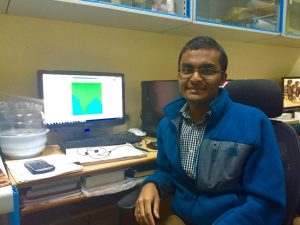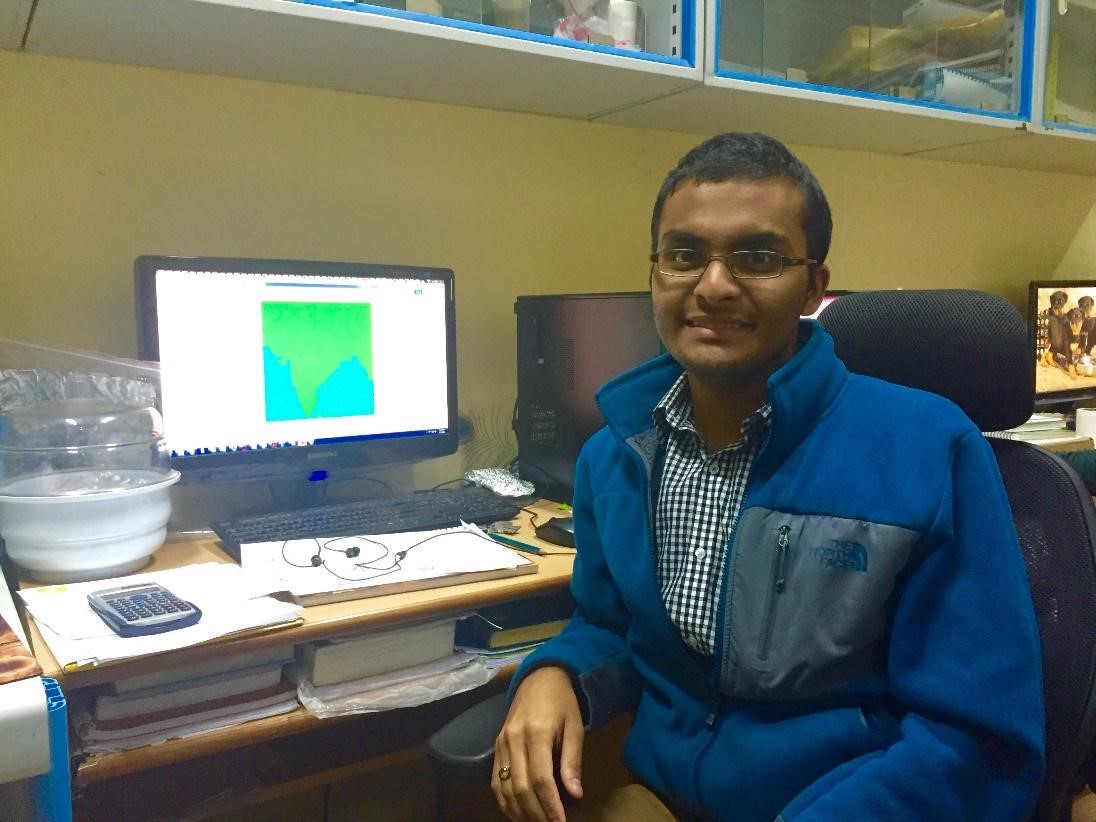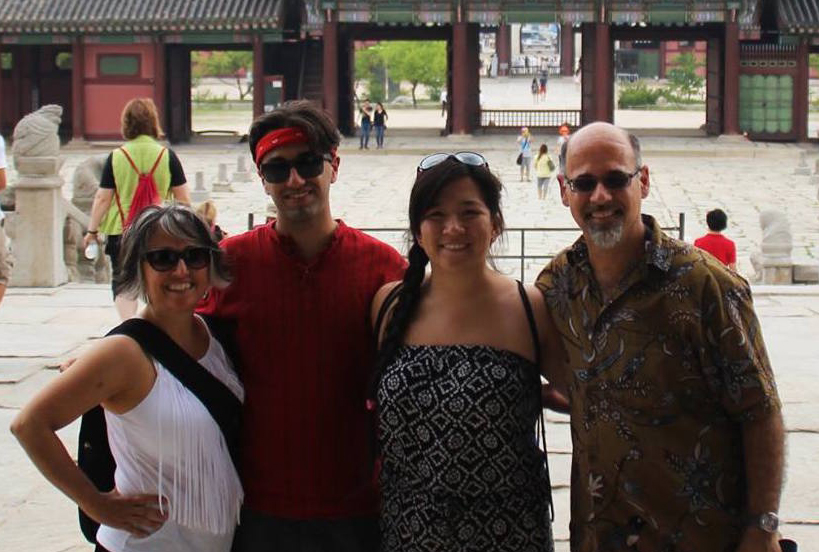
Shayak Sengupta, 2015-2016, India, sitting in front of output from WRF-Chem on his monitor, an atmospheric model maintained by the National Center for Atmospheric Research (NCAR) and the National Oceanic and Atmospheric Administration (NOAA) in the United States. Sengupta used this model for his Fulbright research to simulate the atmosphere and air pollution over India and ran the model on HPC 2013, one of the fastest supercomputers in India located at IIT Kanpur.
“You grew up in the United States? But your Bengali is so fluent!”
“Why don’t you speak with an accent? Didn’t you have problems learning English?”
“It’s interesting that you came here. Don’t most people go to the U.S.?”
These are just some of the pleasantly surprising comments I heard throughout my experience as a Fulbright-Nehru Student Researcher at the Indian Institute of Technology, Kanpur (IIT Kanpur), where I studied air pollution control at Indian coal power stations. While India’s economy continues to grow at a tremendous rate and the country works to deliver electricity to millions of its citizens who do not have power, it still faces challenges related to poor air quality, especially in urban areas. During my Fulbright-Nehru grant, I conducted field visits to coal power plants and used computational models to understand how better air pollution control at these stations would affect ambient air quality.
While it was not my first time visiting India, working for nine months in Kanpur was very different than my previous trips to see family in Kolkata. Kanpur, where my research was based, is a much smaller city about five hours southeast of New Delhi. Hindi, not Bengali which I grew up speaking, is the working language for most IIT Kanpur students who come from all over India. While English is used extensively in academics, it wasn’t as useful for daily interactions. My Fulbright-Nehru year had its challenges. When I first arrived, I was barely able to communicate in Hindi while attempting to navigate Kanpur Central, one of India’s busiest railway stations. Nevertheless, my time in India was an immensely rewarding period of personal and professional growth. Moreover, my Fulbright experience allowed me to reflect on my life as an Indian-American and the unique ways in which I am able to contribute to promoting mutual understanding between the peoples of the United States and India.
I represent a myriad of identities, but Indian-American has been and continues to be the strongest marker of who I am. Not until my Fulbright-Nehru year did I discover and take advantage of the full potential of this identity. From strengthening my Bengali in a professional context during my field visits in eastern India, to discussing issues in air quality with Indian researchers in Delhi and Mumbai, my Fulbright-Nehru experience gave me opportunities to learn about India’s energy, air quality, and climate challenges. My Indian colleagues gave me insight into how scientists study sources of air pollution in the context of a rapidly growing country. Likewise, as an American researcher, I exchanged ideas on how the United States has tackled air pollution while maintaining quality, affordable electricity for more than 45 years since Congress passed the Clean Air Act.
Outside of my professional pursuits, my friendships at IIT Kanpur gave me a chance to connect with my host community by sharing my perspective as an American of Indian-origin.
I enjoyed speaking to my friends about my unique role in the diverse fabric of America. While Americans come from different backgrounds, values such as equality, freedom of expression and thought, innovation, hard work, and achievement bind us together. I am still in touch with my friends and am currently helping several explore educational opportunities in the United States.

Shayak Sengupta, 2015-2016, India (right), with his friend Mrinmoy Chakraborty, an M.Tech. student in environmental management and engineering at IIT Kanpur. Chakraborty was studying the chemistry of air particles in India using field and lab methods and wanted to learn more about WRF-Chem, with another output of the model on the monitor behind them.
My parents arrived in the United States more than 35 years ago in search of opportunities for a better life, but they never forgot where they came from. My Fulbright-Nehru experience was a testimony to my family’s journey: to not only learn about my Indian heritage, but to also make a contribution to the United States.
Now that I’m back home as a PhD student, I share what I learned during my Fulbright in India with fellow scientists studying air pollution. In maintaining institutional ties that I established during my Fulbright grant, I hope to return to India to conduct part of my dissertation research.
My Fulbright year showed me the ways in which I can leverage the relationships I formed, and ultimately, my identity. I am proud of the role I have played in strengthening ties between India and the United States, and I see my Fulbright-Nehru grant as the beginning of a fruitful, deeper relationship with India, one filled with optimism to tackle common challenges.
To those looking to apply for the program, here is my advice:
- Reflect on what motivates you academically and personally. What makes you “tick” and what are you passionate about?
- Think about how your personal and professional experiences to date have contributed to the vibrancy of the United States. How can these experiences help you to connect with those who may be different than you in your potential host country?
- Tell a story through your application; every component should contribute to a cohesive story of what makes you an ideal ambassador abroad for your community back home.
Have questions for Shayak about his Fulbright experiences in India and as a Fulbright Alumni Ambassador? You can reach him at S.Sengupta.alumniambassador@fulbrightmail.org.



No Comments